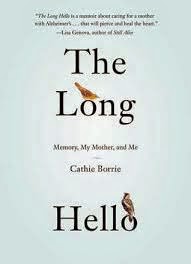 |
| 2nd Edition Published 6 January 2015 |
I'm including her book in my list of memoirs about giving care to a family member with dementia.
However, the topics she covers and the genre she creates really differs from most books labeled "dementia memoirs."
Yes, Borrie details her relationship with her mother, Jo, over those seven years of caregiving.
Yes, like many other caregivers, she also reaches back to share memories from her mother's past, her own past and their shared experience.
Borrie is one of two children, and she's a child of divorce. Then her brother dies while still a teen. Borrie and her mother have sought for decades to survive these difficulties--even to thrive despite the sorrow, anger and pain inherent in these and other losses.
But Borrie writes a memoir in a way that does much, much more than preserve the past that she and her mother share. Her mother's dementia sets the stage for Borrie to create a new relationship with her mother in the present. And while doing so, she creates a new person in herself.
Borrie perceives her mother to have richness and insight borne out of her mother's mixed diagnosis of Parkinson's Disease and Alzheimer's Disease. To emphasize the point: she's implying that it's because of her diagnosis not despite of it. Her mother's guard comes down, revealing more raw emotion and more blunt opinions. Her mother's language doesn't decay for Borrie; it transforms.
Borrie's writing style also extends beyond prose. She includes a number of exchanges between herself and her mother. But this isn't strict dialogue--it's poetry.
Even the prose surrounding these exchanges has a quality of the poetic since it's image rich, lyric, philosophical, emotional. Borrie weaves in recurring images of birds and water from her native Canada. As the book progresses, she employs more and more images of dancing as well. These images end up merging in spectacular ways.
In fact the whole project--form and content--is poetic. Borrie takes a difficult, complex, and emotionally charged life experience and creates something beautiful and inspiring. Spoiler: Her life becomes the primary medium of her art. When I came to this epiphany, I felt a sea change, opening new possibilities for myself. Inspiring!
Borrie follows the changes in her mother's thinking, feeling and behavior like a dancer following another person's lead. And what results is so moving that I wept openly while reading her book on a very crowded plane.
In his poem, "Among School Children" Yeats asks, "How can we know the dancer from the dance?" Borrie has me asking, "How can we know the two dancers from the dance?"
And that's the best I can do to convey the power and the beauty of her book.
Related:
Love in the Land of Dementia: Book Review <--Deborah Shouse's memoir has similar themes.
Books about Dementia
Movies about Dementia
No comments:
New comments are not allowed.